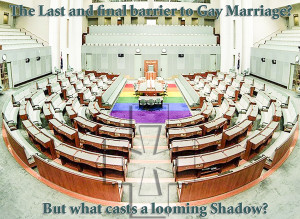
An associate of a friend (I’ll call him “Rus” not because that is his name, but I don’t what to be talking about him long-handedly throughout) said recently in a FB post. “I think the Church NEEDS to make marriage a Christian rite only. Let’s call it not a marriage but a Holy Union. Let others marry. It is a union between a man, a woman and God. If you don’t love God, no Holy or Spiritual Union.” I have read many other similar sentiments in the Christian community that hold to a belief that “true marriage” was instituted by Christ and somehow belongs to the Church. Still, there is a dominant fear that the word “marriage” is being taken away from Christians who want an exclusive license to the word “marriage”. “Rus” is at least prepared to concede that “marriage” was probably not the term they wanted to hold onto, whereas many Christian apologists think otherwise. Hanging onto “marriage” allows the privilege and first right of access. Access which needs to be jealously guarded against the infidels who would spoil it with their desire to put the word “gay” in front of it. There is this irrational fear that accepting “gay” in front would somehow weaken “marriage”. Seriously? That institution is under severe attack by heterosexuals themselves. Misogyny, Divorce, the rising tide of domestic violence, and abuse of children are all symptomatic of heterosexual marriage and yet allowing someone else to participate, is going to ruin your marriage? If that is your concern, perhaps you need to question about what you think is “marriage”. It’s between two people. You want to invite the rest of the world in and then perhaps you’re looking for trouble? As one young American said: “They are dwelling in the false dilemma universe of “if they get something that [that in no way takes it from me], then I will feel like I had it taken from me.” A piece of twisted logic from conservative thinkers, although this is how it comes across to the rest of us.
Marriage or something else?
The religious sanctity of “marriage” is an intriguing argument by the church because it assumes that “marriage” was their idea, and that has purely religious origins, which have been co-opted by the secular. I suspect that even “Rus” realised that was not an argument he was likely to win on evidence which is why he opted for calling it something else. Perhaps the term of a more biblical origin you may be looking for is “Yoked”. “yoked” was biblically speaking a term well-associated with husbandry, frequently used metaphorically for subjection in the old testament, but used differently by Christ in Matthew 11:29. Christ referred to “My yoke” which therein meant “the service of God as I teach it”. “Yoked” takes on a New Testament subjection such as epitomised by Ephesians 5:22 “Wives, submit yourselves unto your own husbands…” It is later used in the more commonly known quote of 2 Corinthians 6:14 – “Be ye not unequally yoked together with unbelievers…” and not to be confused with “Yoked with an Unbeliever” which was a short story by Rudyard Kipling (a favourite author of mine when I was young). Many a Christian apologist has used Yoked as a reference, to what later in the 13th century, became the word “Marriage”. In these centuries the word “mariage” (from which the word “marriage” was later derived) occurs in Middle English in the mid 12th century. There was a slightly older term marier (to marry) from the French. There was a not dissimilar older Latin term maritare meaning to provide with a husband or wife. The reality was, that aside from the sideline mention of celebrations or feasts duly associated nowhere is the joining or being yoked to another defined in the biblical literature. Garry Wills points out “The early church had no specific rite for marriage. This was left up to the secular authorities of the Roman Empire, since marriage is a legal concern for the legitimacy of heirs”. Everything we do by way of ceremony into which the church has adopted a role of significance in western culture was developed well after the “fact”, by a matter of centuries. So, NO, marriage is not an exclusively Christian term, and the Church does not hold some “right of access” to it.
The DOMA Ruling
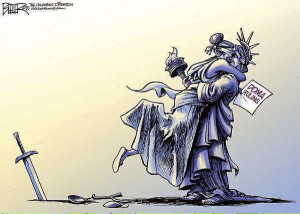
In truth, contemporary marriage in a church is not, of itself, recognised legally as such. Allow me to explain what I mean by that. One of the interesting aspects on the American DOMA hearings that resulted in marriage equality being recognised in the USA was the confusion that occurred on the very first day of the hearings over an assumption that we, in Australia, also make.
On the first day of hearings taking place before the United States Supreme Court, the justices found out that both religion and religious establishments have nothing to do with the legality of same-sex marriage or for that matter, marriage at all. Gay rights lawyer Mary Bonauto had to point out the rather obvious to the justices that, “When people get married in a church, it isn’t recognised by the government without the legal documentation”. And guess what? It is the same system here. Marriage is a civil and legal state that exists between two people (OK, … in Australia the two people are not the same gender even though the majority of Australians would support it – 72% actually).
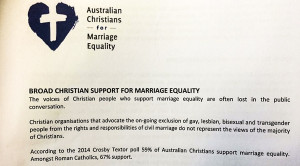
You don’t need the Church. Marriage is not about the church! The church provides a ceremony, it gives spiritual and moral guidance, but technically the perspective of the State is that the Church does not marry you legally. The phrase in marriage law is, “solemnise” not “ratify”. That document you sign in the middle of the service is what gives you the legal status – not the service, not the church. Now, under the “eyes of God” (well that is a different series of discussions for a later article) but the marriage equality lobby is not after being “yoked”, “joined”, “holy union-ed”, or approved of by the Church. They want the right to be legally “married” in the State.
Against and vaguely against
The religious and conservative rejection of “marriage equality” divides into two camps. There are those who would accept same-sex unions provided there was a differentiation of terminology and/or celebration to segregate the two. And there are they who believe “marriage” is exclusively between a man and a woman and that homosexuality is unacceptable, as is their access to “marriage”. But is “marriage” a Christian thing? The “marriage” ceremony, by all accounts, wasn’t practised till the 9th Century, and it wasn’t until the 12th Century that a priest became involved and not until the 13th Century that priests took charge of it.
Bills before Parliament
Garry Wills also the question “why if you accept gay unions would one oppose gay marriage?” This is a sensible and logical question, but It does not take into account the misconceptions promoted politically (and religiously) about the transitions from “union” to “marriage”. In the Australian on July 7th, there was an article that began “Senator David Leyonhjelm’s 2014 “freedom to marry” bill seeks to mollify conservatives by allowing civil celebrants to refuse to marry homosexual couples on conscience grounds.” It was an article that spoke about the Presbyterian Church desiring to withdraw the “whole church from the Marriage Act” if same-sex marriage was the legalised. The perception is that the Church is under some form of threat of having to perform same-sex marriages against their conscience. Except for the Bill I am about to discuss, it isn’t.
Leyonhjelm’s bill is a threat to the church’s conscience because Leyonhjelm wants to add the following to section 71 of the Act. “(3) If a chaplain refuses to solemnise a marriage because the marriage is not the marriage of a man and a woman, the chaplain must, if possible, substitute another chaplain who is willing to solemnise the marriage.” In short, it does exactly what the church should be worried about, as it removes their freedom to simply say “NO” as the onus is on the church to find a substitute chaplain.
On the other hand, the Marriage Equality Bill 2015 as put forward by Bill Shorten and Tanya Plibersek is merely an amendment to the 1961 Marriage Act to define marriage as a union of two people and to ensure that ministers of religion are not bound to solemnise marriage by any other law. The definition of marriage becomes “marriage means the union of two people to the exclusion of all others, voluntarily entered into for life”. Essentially it is about the reference that “a man and a woman”, be substituted with the term “two people” and the term “husband”, become “partner”. (Which is what it was before John Howard changed in 2004.) Unlike Leyonhjelm’s proposal, there is no onus on the church at all to do anything different from what they have always done. I have read both legal bills before parliament, and the Marriage Equality Bill is way more respecting of the conservative Christian view that is the already deeply conservative Senator David Leyonhjelm. Curious!? So essentially the statement the Australian newspaper leads off with – that purports to assume Leyonhjelm’s bill will “mollify conservatives” – should frankly be recognised as patently untrue. On the other hand, Labor’s Marriage Equality Bill preserves the Church’s sensitivities and rights of refusal. This is the bill, they that accept a gay legal union – be ye within or without the church – should be backing.
Legal protections of Marriage Equality
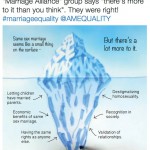
As for the reasons why one should consider same-sex marriage in terms of what protections it may provide, I will send you to my article on “Marriage by Definition”. You will find a list of the issues of marriage equality would definitively resolve. I won’t repeat myself. You will also find there discussed the darker side of what Old Testament “Biblical” marriage involved.
Between a Man and a Woman
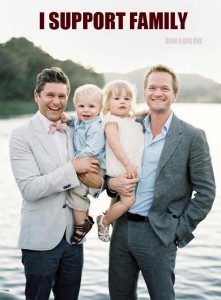
Let’s consider the other ideology that has been demonising gays for centuries and simply refuse to share “marriage” often under the presumption that marriage equality will somehow affect heterosexual marriage and ruin it for life. Now there is the extreme view of the Canberra Couple who were so disturbed that they said they would prefer to be divorced than see same-sex marriage allowed. I am not even going to entertain that nonsense, and I think that the couple has been given quite enough “hell” over that irrational response. I’d like to talk to the more rational concerns raised by Rev Dr Micheal Jensen who wrote clearly in “The Drum” why he holds “the case for traditional marriage as being between one man and one woman”. He upholds the usual, “it’s for the children” argument which I dealt with in my “sex” article as well as my “letter to Eric Abetz”. Read these and save me from repeats. Jensen also produced an argument based around the terms of “equality” and that a redefined marriage will not be “marriage” as we know it. Well .. yes … I think that is the point of it. It has changed historically, and it is continuing to change, which Rev Jensen doesn’t want. He wants the changes to stop. He is comfortable with what it has evolved into today.
Equality & Equivalence
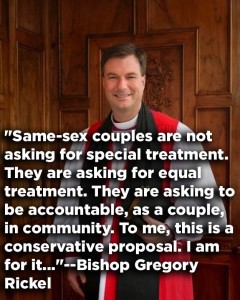
His point on equality is pretty obscurely expressed, but I think the point was that equality is not equivalency. By this, I believe he means that providing “marriage” to different people with different relationships and different means by which they produce and raise children does not constitute “equality” and so, therefore, it is not about “equality”. The argument is that a relationship between two same-sex partners is fundamentally different on a physical and perhaps psychological basis than a relationship between heterosexual couples and therefore not equal, and cannot be treated as such. Technically there are circumstances where that is correct, but primarily we are playing with syntax here, and the subject is; people’s lives. Same-sex couples can and do operate on the same psychologically basis as heterosexual couples. They are, after all, both human. Disallowing access to the legal protections of marriage is discriminatory and unfairly endorses one set of relationships over another. Gay couples produce and raise children, they live together, grow old and participate in the community as couples and families. Same-sex couples – contrary to the frequent statement that they don’t – do give birth – or provide the seed for their children, adopt and raise children, in the same manner, a heterosexual couple does. The attempt to differentiate by the production of Children as something that renders them unequal is nonsensical and fictitious. Heterosexuals raise children of their own, not their own, adopted, from past marriages, previous indiscretions or partners, use IVF (the most significantly googled phrase in Australia) or passed on from being orphaned. And guess what? So do Gay couples. And guess what? Their kids are fine and in fact in many cases better than fine. In fact, if you want evidence then you need to look no further than the findings of Dr Bronwyn Harman’s 5-year research project into family structures. *1*
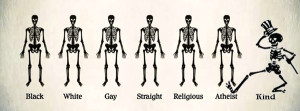
Dr Harman’s research showed that LGBTQI families (inclusive of children) rated as “happier” than most family structures existing in Australia. At least these children are wanted, which is more than I can say for the offspring of some heterosexual couples. And guess what? The Australian Government research has compiled innumerable papers that confirm this. We aren’t really all that different. We use the term Equality loosely, yes. I would concede that. But the “equality” we should be talking about is the form of it that seeks an end to discrimination. That is what is meant by “equality”. Yeah, they are different. So are a lot of people. It’s called humanity. Get over it!
History’s True Tales
The Reverend Jensen went onto say, “It is the meaning of marriage that emerges from all human cultures as they reflect on and experience what it is to be male and female. It is only in the last 15 years that anyone has seriously thought differently.” Which is not at all dissimilar to what Abbott said in an ABC interview, “Prior to that, it wouldn’t have occurred to anyone in our culture and civilisation that marriage was not between a man and a woman.”
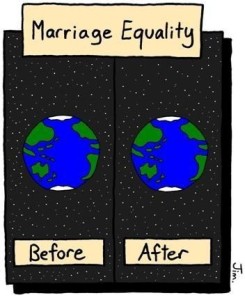
That isn’t the truth expressed by either man. “Marriage by definition” has changed radically and in previous civilisations gay marriage, polygamy and what we would today, call incest and child sexual abuse, featured very strongly as a societally acceptable definition for “marriage”. (I have outlined a number of these changes in my post “Marriage by definition”.) Voodoo is a religion that celebrates gay unions. It wasn’t that long ago that the Mormon churches were actively polygamous. “Gay marriage” has been a feature of Canadian society for a decade. [And hasn’t that lead to polygamy, people wanting to marry children, their dogs, camels, etc., etc.? …. Well NO actually … It hasn’t!] So much time and effort are spent in speculative arguments about what a slippery slope this legislative move is! Yet everyone doing so never points to entire countries that have had the legislative acceptance in place for years and says “See what is happening there!!” Because … guess what … it isn’t! Such things are already illegal even if you attempted to define marriage in such a way that could permit them. Marriage is a legal contract and as such children and animals cannot commit to legal agreements. Vast areas of the Law would need to be changed for anyone to slip down that particular slope. That any politician – particularly one with a legal background, such as Eric Abetz – would propose this as a possibility is being deliberately misleading and patently untruthful.
Since the Dawn of Civilisation
SO, No, “marriage” has been a concept in a state of flux since the dawn of civilisation as to who it involves, what sex they are, how old they are, how many it involves. And YES, it has been an issue people have discussed for the last 15 years, in our culture and our civilisation. It has been on the agenda since before at least two Roman Emperors we know of were in same-sex unions. It was on the agenda through the middle ages when a priest at a small chapel married Pedro Díaz and Muño Vandilaz in the Galician municipality of Rairiz de Veiga in Spain. Also in the 1960’s in Australia with the ACT Homosexual Law Reform Society and the 1970’s when Richard Baker and James McConnell applied to Hennepin County District Court clerk Gerald Nelson for a marriage license while we in Australia formed the Melbourne based “Society Five “gay rights organisation. It was still on the agenda in the 1990’s when California was considering a bill to permit same-sex marriage, and Australia was passing the 1994 Human Rights (Sexual Conduct) Act.
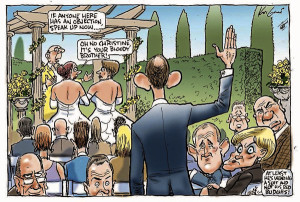
The recent history in the 21st Century I am sure most are at least aware of (well aside from Tony Abbott and Rev Jensen). Precisely at what point in time Rev Jensen and Tony Abbott, were we not dealing with these issues? I do get that the Conservative elements would rather it was swept back under the carpet and would conveniently go away (in the manner in which Tony Abbott described it as “the fashion of the moment“) but … sorry, it is all out in the open now. Deal with it! Stop avoiding it!
No claim, no fame, no reason, no rhyme
Summarising so far: The church has no specific claim on “marriage” by way of language or law. Marriage has been changing as an institution from one generation to the next. Same-sex marriage existed in ancient civilisations as it does in numerous countries around the world today. Civilisations and countries have not collapsed into marital anarchy because of it. Under all proposed legislation (bar Leyonhjelm’s bill) the church retains its rights to object or accept consecrating a couple’s union, as they always have. There other words and phrases available to the church if it wants to be “yoked” to separating themselves from the world to hold their private club of holy marriages (or whatever they want to call them).
But God Said…
There is still, our mate “Rus” whose objection to it boiled down to: “God abhors homosexuality among other things. To Him, it is an abomination.” This is a commonly held view amongst conservative Christians, and I suspect one that is not going anywhere fast. So where does this come from? In the Catholic Canon and prayer book, there is nothing that forbids marriage between persons of same sex. Nowhere in the Constitution and Canons – the laws of the Episcopal Church or its Book of Common Prayer is marriage equality rejected or forbidden. It is simply never mentioned for two reasons.
- it was simply not anticipated.
- while “sodomy”*2* has long been identified as the most heinous of sins by some cardinals there has always been a long history in the secret lives of the Vatican’s cardinals, bishops and monks in which homosexual traditions have been a matter of historical record.
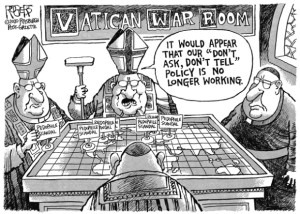
So in the interests, of not offending the hypocrisy of the church, it is not surprising it is never mentioned. Negative attitudes to homosexuality have been in the church since the teachings of the early church fathers following the Roman emperor’s conversion to Christianity. It stood in contrast to long-held Greek and Roman attitudes towards same-sex relations, who also felt it was permissible between an adult and a prepubescent or adolescent male. Rebuking those who indulged in debauching of boys was common in the early church history even though it was practised in secret by some clergy. Back then and even today (with exceptions of some sections of the Catholic clergy) it was/is seen by some of the church and most civilised societies as reprehensible. The practice by Catholic priests in our lifetime has drawn revulsion, criticism and legal redress. I need to stress that marriage equality is not a descent into that perversion!! I am only going down this dark alleyway to help you understand the historically biblical objections to what we think are references to “homosexuality” in the New Testament. This distinction was not although, as obvious in the context of the history in which it was written.
But Jesus said …
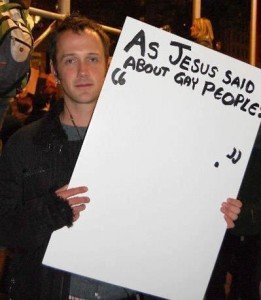
Let’s get one issue out of the way. Jesus said nothing about homosexuality. Sorry, he didn’t! Big disappointment to the conservative Christian lobby, but there you go. So where do you turn? Classic Old Testament stuff: Sodom and Gomorrah. I often find myself wondering if the people who pull this one out, have ever actually read the story. Sodom and Gomorrah is a story about sexual abuse. When someone rocks up at your door wanting to break it in, to have their way with you or your guests, it’s not about love or sex; it’s about abuse, it’s about rape. If what happened to Lot and his family happened today outside your house, you would phone the police, scream for your neighbours to help and load your shotguns. It is not about sexual preferences it is about RAPE and ABUSE. It’s sure as hell not about LOVE – gay or otherwise! Read the damn text!
But Leviticus said …
Interestingly the first five books of the Bible declares that God apparently hates a lot of things. The book of early Jewish Law is certainly a prime example. Leviticus 20:13 doesn’t say you should stop “Gay” marriage it says you should kill “Gay” people. So unless you are willing to follow through on that (and I would hope you aren’t), you are not compliant with your literalistic biblical instruction. Of course, the issue then becomes, which Law do you follow because wasn’t one of the Ten Commandments mentioned in Exodus 20 Verse 13, “Thou shalt not kill!”? So which law holds dominance? Are the instructions of Leviticus a priestly code emphasising ritual, legality and moral practices of that age and at a time when they were a bunch of nomad refugees? Were they trying to cobble together legalistic order to keep themselves safe and together on a journey that would take a generation to complete? Could these very laws be an example of these men’s natural inclination to disobey the primary commandments and are there to show us how quickly men go astray from the commands of God? Or were these rather beliefs or commandments that were to travel down through all history? Which laws were written by men and which by God? Does “killing people” because of issues of sexuality, trump the commandment brought down by Moses from Mt. Sinai, that says one should “not kill”. Which Law was meant to last? If you choose one, then what does that say about the impermanence of the other?
Let’s face it there are lots of those sort of things in the early biblical literature. When I raised this with “Rus”, his reply was “Death meant “dead to God” not literally put to death”. What?? The Israelites have just made a harsh Exodus across a desert, having escaped tyrannical enslavement in Egypt where they were treated as Slaves to be whipped, beaten, used and often brutally killed. They had survived this and their journey to reach Mt. Sinai. Death was something that accompanied their life in proportions probably unthinkable to contemporary western man. When it is written “they shall surely be put to death; their blood shall be upon them”, I find it very hard to believe this ragtag battered and bruised nation acclimatised to bruising and brutal violence as a part of their daily life, decided this was more of a spiritual denial of access to the holy aspects of life.
This, by the way, was not the only crime you could be put to death for according to Leviticus. These being Adultery, prostitution, various forms of sexual deviancy, practising magic, theft, murder, cursing your father or mother, and blasphemy. And, heavens you did not want to be a Priest’s child who had contravened the law because being burnt alive is not a nice way to die. So, NO, “Rus”, I don’t see it as “spiritual death” at all. But OK, “Rus”, if sanitising “death threats” by believing them to be more psychic than real, helps you to sleep better at night … Fine.
Returning to my earlier point. Given the conflict between Laws of priests in Leviticus verses, the Laws of Mt Sinai handed down by Moses earlier in Genesis, which should have been followed? Should you even entertain the notion that Leviticus represents any reasonable lasting grounds for objecting to marriage equality in the 21st Century or was it an example of how completely and quickly misled men can become?
Today’s Samaritans?
This was Israel’s laws at a brutal and unrelenting part of their history. (Somewhat like today some might suggest … but I digress.) History is about change and development. Laws change, people change, society changes and perhaps, what was once the “Samaritan” that Jesus spoke against being discriminatory against, are now another group of folks in the LGBTQI community. Dare I suggest that the Bible is not a book of rigid, legalistic laws but guidance for a changing world. Christian communities need to grow with it and create our own “biblical” stories of compassion and love. Perhaps I am getting sidetracked here? Back to the literal interpretation of the Bible.
But Paul said …
Then there is the famously picked Romans 1:26-27 used by the entire anti-gay Christian brigade: “For this reason, God gave them up to dishonourable passions. For their women exchanged natural relations for those that are contrary to nature; and the men likewise gave up natural relations with women and were consumed with passion for one another, men committing shameless acts with men and receiving in themselves the due penalty for their error.”
You need to remember that the Jew’s considered a child of 13 an adult. Recall also what I said about Greek and Roman attitudes to sexual abuse earlier. This was a letter being written to the Roman church. Now read above again and tell me what it is clearly about, in the context of the society in which they lived? The standards for legal consent to sexual relations are now sixteen, meaning these historical standards would nowadays fall into the category of pedophilia.
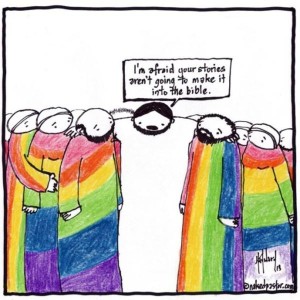
Then we go to the next prime choice for this argument, 1 Corinthians 6:9 for which numerous translations of the Bible speak of homosexuals or homosexuality being something that denies people access to God. There it is explicitly stated. “Bingo”, yell the conservative Christians! Gotcha! … EXCEPT … sorry, … but how do I break this to you gently? Homosexuality as a word is first found in print in 1869 in a German pamphlet and is not found in use in English till 1892, and it had a different meaning. It wasn’t till 1929 it was first recorded as a Noun with its current meaning and as an adjective in 1933.
Who were the real sodomites?
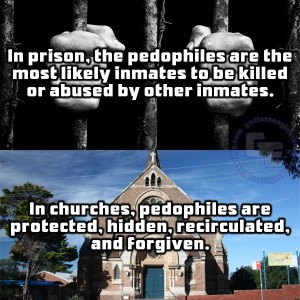
Perhaps you might find in the original text, it said “sodomites”, as it, like the well used Jude 1:7 where it references the same history from which the term arises. In case you missed that paragraph, … well, I have already dealt with Sodom and Gomorrah. It’s all about sexual abuse, not Love. And if you don’t know the difference between abuse and love, you should probably never marry or have children. Was “sodomy” as it was defined then, how we define “sodomy” now? “Marriage” as a contractual exchange for property, provision of a dowry and rights of heirs is not what “marriage” is today either. If this 2000-year-old reference to “sodomy” is about the abuse, rape, sexual assault perpetrated by the culture of Sodom and Gomorrah, then this has nothing to do with “marriage equality” or “homosexual love” for that matter. In fact, it better represents a condemnation of these acts of “sodomy”/abuses prevalent amongst the Catholic Church’s clergy (and yes, I know other denominations did it too). It should properly be understood as a rebuke for the church’s position of supporting, moving and hiding its priestly abusers from the consequences of their “sin”. I am sure Cardinal Pell would disagree with me.
But the Church celebrated …
So if the alleged references to “homosexuality” in the Bible – 1900 years before the word was coined – were about “gay love” and not actually “sodomy” (defined as I am suggesting, like abuse, rape and pedophilia, as we know it), then there is a question that has to be asked. Why are there dozens of records from the early church which recorded ceremonies where two men were joined in unions? These are revealed by historian, John Boswell, who published a book in 1994 called “Same-Sex Unions in Pre-Modern Europe” based on his earlier publication from the 1980’s called “Christianity, Social Tolerance, and Homosexuality”. The issue is the course that it is not only “sodomy” that has changed its meaning in the modern world, but also “marriage”. You can read more about it in the article, Gay marriage in the year 100 AD.
The Letter or the Spirit of the Law?
So unless you’re going on a right-wing rage-fuelled mass killing spree for all the crimes committed in modern society (and I think there have been way too many of them in this era) on the basis that “God says in Leviticus” you should kill these people (in contravention of the don’t kill commandment in Genesis), just perhaps, you are open to a “tiny” bit of “wriggle room” in your thinking? Perhaps you will then be open to the “Spirit” rather than the “Letter of the Law”? (If indeed Leviticus was an example of Law and not an example of rebellion.)
You know the Spirit I am talking about, the one Christ suggested was based on “Love”. Marriage Equality is about the freedom to be choosing who you love and if “love” means something – and for some strange reason my conception of Christianity has just a tiny bit to do with “love” – then perhaps there is room in your hearts to let go of your prejudice. Then the game is open to conceding that “marriage” is a changing celebration and realising how much that word has changed both biblically and socially.
But I like my Bigotry
If you want to maintain justifying prejudice, biblically, then you are set. It’s not hard to do. You cherry pick a few verses, back it with a bit of good Old Testament judgement, you ignore completely the culture, previous laws and historical perspective, you redefine the ancient language with contemporary meaning that the original words never had, and you draw inferences that aren’t naturally there … and you are set. It doesn’t require you to struggle with your faith to search for the light at the end of the tunnel. Stay where you are. It’s comfortable in the dark, it’s cool, it’s easy to deal with, and there is not much to which to see or respond. Facing the world in the light of a society in flux, in change, in tackling hard questions about how people love and give love and express love, is probably just too hard. Stay with the mushrooms, don’t be the salt.*3*
My reasons why
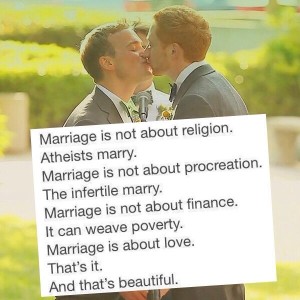
I am an ex-theological student, ex-parish elder and ex-member of a church which married my wife and I. We participate in another denomination’s church these days and not because we have any disrespect for the former – we have just moved on. We wrote our marriage service over a decade back. We celebrated in a Church that (as it turned out) held only one wedding service in that entire year. Ours! We deliberately changed the phrase “man and a woman” to “two people” in our vows, officiated by a minister I had known for two decades. Four men stood beside us as we made our vows. Two of them were my best friends from college days; the other two were a gay couple (my wife’s best friends) that over a decade later are still together. They had been together for more than a decade before we married. It was for them that my wife wanted to have our vows changed from the standard. We still often talk and visit one another even though we live in different cities nowadays. We encourage each other in our respective relationships as is the promise they made at our wedding. They listen to us tackle the daily struggle and joys of relationship issues, and we do the same for them. Love holds us altogether irrespective of our differing sexualities. Perhaps one day we can stand beside them as they take their vows and make promises to them to uphold their marriage and I would be proud and honoured to do so.
———//———
Footnotes.
- * Sun Herald for August 16th on page 15 reported on research by Dr Bronwyn Harman, at Edith Cowan University (ECU)’s School of Psychology and Social Sciences.
- * I put “sodomy” in quotes because what that word means depends on what era you are discussing.
- * I am deliberately cryptic here as Salt is used allegorically by Christ and I am trying to induce some thinking amongst some of the more theologically minded reading this.
———//———
Post-Script
It is July 2018 and Australians have won the battle for Marriage Equality in the parliament after a long, protracted battle with undoubtedly many casualties. Nevertheless, it is done, and nothing that the religious conservatives feared has come to pass.
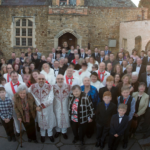
One thing that is important to myself and my wife has, although. On a cool Saturday afternoon in June 2018 when in the halls of Montsalvat in Melbourne, a celebrant asked myself and my wife, “Who gives these two men to be married?” My wife and I replied simultaneously, “I do!“. Dressed in a white suit, not unlike the one his dad was wearing, I watched with pride as my small son stepped forward as “ring bearer” to hand the rings to our two friends and spoke a simple but endearing wish to both men. After two decades of being together, the two men who affirmed our vows beside us a decade and a half before could finally marry. It was my privilege to be a part of their wedding, and a long-held ambition, if you have read what I wrote above. As darkness descended on Montsalvat and the joyous sounds of over a hundred guests revelling in the final victory of equality and love, one thought repeated in my mind. “Mission accomplished!”
P.P.S.
If you are at all curious still as to the path that a man of faith may have trod in his “Damascus journey” to arrive at this point of enlightenment, read this link.